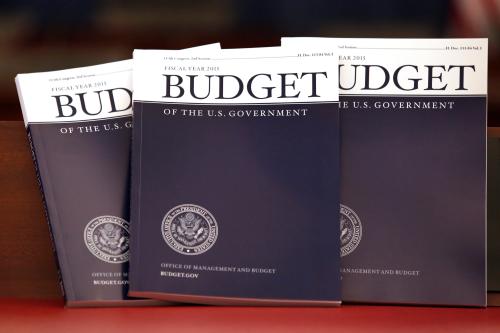This article originally appeared in The Hill on February 20, 2018.
Let’s not mince words: Our leaders in Washington, D.C. are displaying a degree of fiscal madness that is historically unprecedented, piling up deficits and debt unheard of in times of peace. As a Democrat and a Republican, we believe members of both parties bear some responsibility for this situation.
Last week’s budget proposals from the Trump administration forecast $7 trillion of new public debt over the next decade, despite its overly optimistic projections of economic growth and of budget cuts that will not occur. The expected debt and deficits are swollen by the outlandish tax cuts and spending increases passed very recently.
The enormous new deficits will cause the Federal Reserve and financial markets to raise interest rates much faster than before, slowing economic growth and offsetting any positive economic effects the tax cuts might have otherwise generated.
These deficits will put pressure on Congress to cut important safety-net programs for the poor and unemployed, as well as sensible investments in health care and education, adding to the already regressive effects of the tax bill.
As baby boomers retire in the next decade and beyond, Social Security and Medicare expenditures will rise more rapidly, potentially threatening defense and other important forms of discretionary spending while creating trillions more dollars of debt. To say that all of this is unsustainable over time should be obvious.
How did we get here? Over the past few decades, Republicans embraced an extreme fiscal doctrine in which tax revenues are never allowed to rise and tax cuts are always implemented, regardless of economic circumstances or the public’s demand for spending on popular retirement and defense programs.
Indeed, 88 percent of Republicans in Congress have signed the “no taxes” pledge of anti-tax activist Grover Norquist, committing themselves to never pay for the public programs that voters want and demand.
At the same time, Democrats have responded by pledging to never raise taxes on anyone but the richest 1-2 percent of Americans and by refusing to even consider sensible limits on or reforms in spending on retirement programs.
In the meantime, President Trump shows absolutely no interest in fiscal responsibility. Indeed, since American voters do not demand any such responsibility from their leaders in Washington, while they heap electoral rewards on those who promise more tax cuts and growing spending, members of Congress face few incentives to be fiscally responsible under current circumstances.
Over the years, there have been many plans to rein in excessive deficits, such as those by the Bowles-Simpson commission or a team led by former Sen. Pete Domenici (R-N.M.) and our Brookings colleague, Alice Rivlin.
But the political courage to implement these ideas has been lacking. An attempt by former House Speaker John Boehner (R-Ohio) and President Obama in 2011 to negotiate a “grand bargain” ended in failure, and no major politician in either party has proposed a return to these negotiations ever since.
What is needed, at least as a first step, is for our political leaders to now confront the madness in their current party platforms and positions. Republicans must renounce the “no taxes” pledge and let the country actually pay for the public goods and services that voters demand.
What is needed, at least as a first step, is for our political leaders to now confront the madness in their current party platforms and positions.
At the same time, Democrats should be more willing to embrace fiscal prudence and publicly acknowledge the need to rein in the costs of retirement programs while raising new revenues.
Reforms in public spending should begin with greater efficiencies in the delivery of services, rather than immediate cuts in services to needy groups. For example, Medicare should be allowed to bargain with pharmaceutical companies over prices and embrace other efforts to reduce the excessive costs of health-care delivery to seniors.
Making Social Security benefits and taxes more progressive could also help reduce costs in that program. Such efforts would enable us to be fiscally responsible without draconian cuts to programs serving low-income Americans, while moderately expanding support in areas like job training or subsidized work.
Only through such efforts will we begin to restore some fiscal sanity in America and address budgetary challenges in a sensible and bipartisan fashion. The worst thing that can be said about the current generation of Americans is that they spent far beyond their willingness to pay, and left the bill for their children and grandchildren.







Commentary
Op-edRestoring fiscal sanity requires bipartisan courage
March 7, 2018